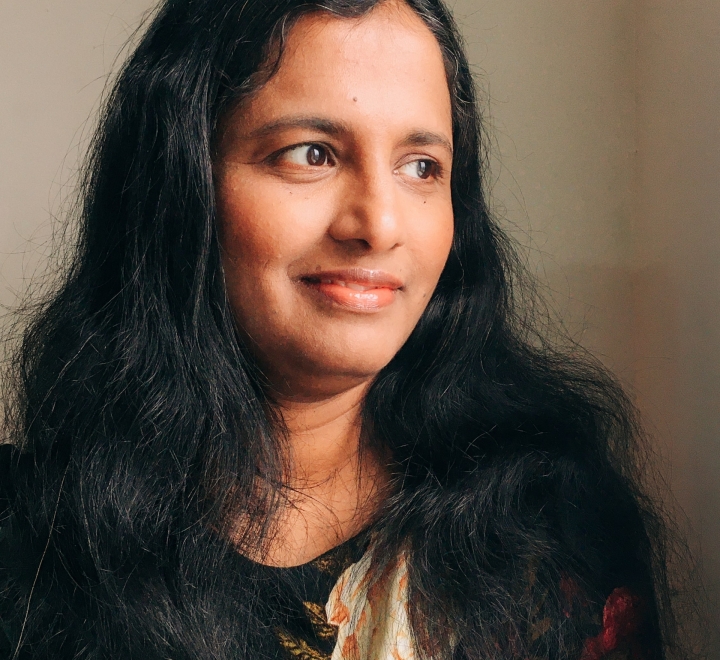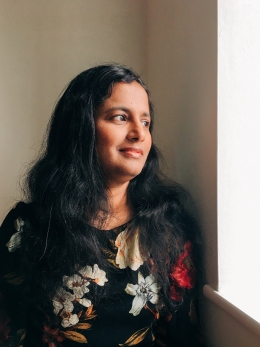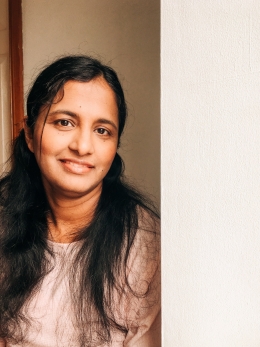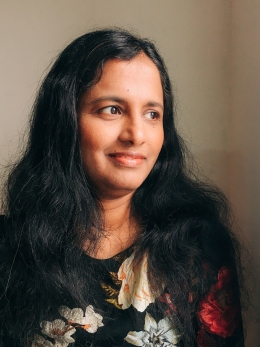

Ask Reeba, a Bronchiectasis Specialist Nurse in Leicester, what she thinks makes a good nurse and her instinctive answer is passion for the job. “If you’re not passionate you won’t be a good nurse,” she says simply.
“I had a friend who went into nursing because it was what her parents wanted, and she ended up having to quit. You have to be fully devoted and have a caring attitude – it’s 100% care.”
It was Reeba’s cousin who first planted the seed of the idea that she could pursue a career in nursing – although she had to conquer a few fears along the way. “She’d seen me caring for my grandparents when they were ill and told me I’d be good at it,” Reeba recalls. Once she’d been reassured that she’d get used to the blood and naturally overcome her fear of it, she was convinced that nursing was for her.
For Reeba, open days are crucial to helping prospective nurses feel more comfortable and aware of what a nursing career entails. “Especially now, with the Coronavirus pandemic and the lack of financial support for training, people are scared of coming into nursing.”
She feels open days give prospective nurses a chance to ask questions and get a real idea of what nursing means and what it will demand from them. It can also allay any fears and help them make an informed decision about whether or not it’s the right career for them.
Another must for Reeba when it comes to being a good nurse is the confidence that comes from knowing your stuff. “If you’re not knowledgeable about your job and you’re not confident in what you’re doing, patients will see that,” she explains.
She remembers her experience when she first moved to her current ward from a gastro ward and took on an entirely different patient group. “The nurse that was already there had been there for around 15 years, so patients knew her and would often ask for her to put in their midline instead of me because they could tell I wasn’t confident and hadn’t done it before.
“I’d expected that. But the more confident I became and the more knowledgeable I got, the more the patients relaxed, and now I have a few regulars who are always happy to see me,” she says. It’s earning her patients’ trust that gives Reeba the most pride as she knows if they trust her and feel confident in her, then she must be doing her job well.

Her knowledge is something that Reeba continues to work on now that she’s a specialist nurse. Her goal is to become an Advanced Nurse Practitioner (ANP) – something she would never have envisaged for herself when she was first starting out. “I wasn’t always very academic in the beginning,” she admits. “But when I became a specialist nurse, I had to do my consultation training and prescription training which was extremely challenging. Once I’d done that, I got a bit more confidence and thought, ‘I can do this’.”
How has nursing changed?
Since starting her career in 1999, Reeba has noticed a host of changes that have impacted nurses’ roles. The biggest thing Reeba has had to contend with has been the increase in paperwork. “We have to do lots of paperwork now, and even though so much of that is on a computer, it still takes a lot of time.”
Not every patient understands the increase in the use of technology on the ward though, which can cause challenges. “I once had a patient who was asking me for painkillers and so I had to check the charts to see what they could have. So, I’m standing there while she’s desperate for pain relief and probably wondering what on earth I’m doing with this iPad. It looks like we’re not working but that’s where all our information is,” she laughs.
Of course, we can’t discuss changes without addressing those brought about by the Coronavirus pandemic. In her current role, Reeba deals mostly with outpatients, running clinics and supporting on home visits. While usually she would see at least eight patients a day, she only saw one or two when the pandemic hit.
“People were so scared to come in because they were afraid of catching the virus,” she explains. But that’s not to say the ward wasn’t busy. Instead, she and her colleagues had to spend lots of time giving patients advice and reassurance over the phone, sending emails, running video clinics and filling out shielding forms.
When the second wave arrived, Reeba says there was another slight dip, but the prospect of a vaccine seemed to make people a little more comfortable. While the first wave saw a lot of requests from people asking for letters confirming they should shield, the arrival of a vaccine brought requests from patients eager to be included in the first rounds of vaccinations.

Caring for respiratory patients
When it comes to caring for her patients, Reeba feels the most important thing is to take time with them. “Our work is so fast-paced,” she says, “but it’s so important to make sure we take the time to sit and listen to our patients and understand what it is that’s worrying them or confusing them.” By taking the time to talk with her patients, Reeba knows she can make their day a little brighter, especially during the time when so few of them were able to see their families. It also helps her get a better understanding of their challenges.
She says a big part of dealing with respiratory patients of any kind is dispelling any fears they might have. It’s key to talk them through their condition and how they can manage it. For many patients, being diagnosed with a respiratory illness can mean having to make some serious life changes.
“One of the biggest concerns of so many patients when they get a diagnosis is that they’ll have to give up smoking, which can be a real challenge for them,” Reeba explains. “They also worry about whether they’ll have to use an oxygen tank or maybe even stop working.” It’s why she feels it’s so crucial to take the time to explain what their condition means for them. That can mean explaining how to manage their feelings of breathlessness and the panic that can come with it or offering reassurance about any life changes they may have to make.

“Working closely with our patients and seeing their confidence in us and in their own ability to manage their condition is one of the best feelings. That’s when I know I’ve done my job well.”





Reeba’s top picks
Books or TV?
TV, definitely. It helps me switch off and escape without needing too much concentration.
Tea or coffee?
Coffee, I’m not a big tea fan.
Early, late or night shift?
I’m definitely more of an early bird so the early shift is my favourite.
On the ward, in practice or out in the community?
On the ward and in practice as that’s where most of my experience is.
Summer or winter?
Summer absolutely! The sunshine and the warm weather always lift my mood.






